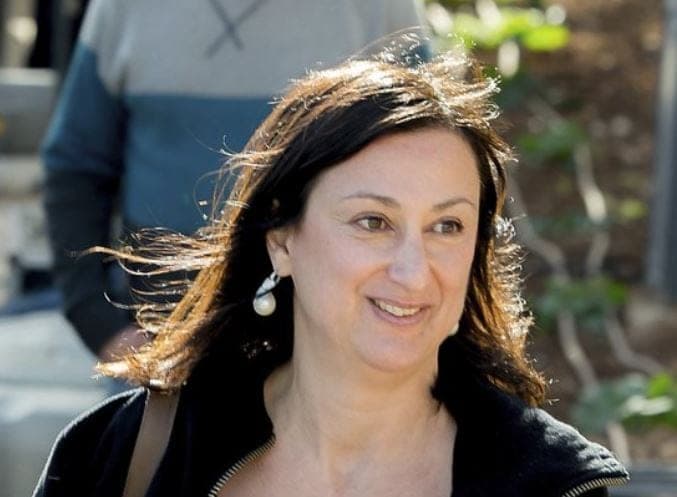A close friend of slain Maltese journalist Daphne Caruana Galizia says the reporter’s life and death is a reminder that “one should have the courage to stand for one’s convictions.”
Maltese priest Father Joseph Borg spoke with Catholic News Agency about Galizia’s legacy.
A well-known Maltese journalist famous for her shocking, in-depth stories exposing government corruption, Galizia was assassinated in October 2017 when a rental car she was driving exploded as she left her home in Bidnija. Three people have been arrested in connection with the bombing.
She was frequently threatened because of her work, and was best known for her investigations into corruption among the Mediterranean nation’s politicians.
Shortly before her death, Galizia had suggested on her blog that Prime Minister Joseph Muscat and his wife had used offshore bank accounts to hide payments from the Azerbaijani ruling family.
Galizia’s claims about the Maltese minister triggered early elections in the country, from which Muscat’s Labour Party managed to come out victorious.
Borg, Director of the Maltese Catholic radio RTK, was familiar with Galizia and wrote an obituary for her in The Guardian after her death. The two had a friendly relationship and were familiar with each others’ work. He had defended her work publicly, and at one point gave evidence in her defense during a court case against her.
In an interview with CNA, Borg said Galizia, who investigated Maltese connections in the 2015 Panama Papers leak on her blog “Running Commentary,” was aware that her work was unlikely to make an impact, but she was nonetheless committed to telling the truth.
When it came time for the elections after the leak, he said Galizia told him “I know that what I’m writing will not make a difference for the election result, people don’t care, but I have to write it because someone has to write it. We have to document what’s happening.”
Journalists have a responsibility to pursue stories like this, Borg said, stressing that “we can’t be consequentialists. We can’t say, ‘what will be the effect if it’s true?’”
“If it’s public interest we have to write it,” he said, explaining that while it is unethical to publish false information, “you can also be unethical by not writing something that you should write, not writing something that is of public interest…(this) is unethical.”
He said Galizia first got involved with investigative stories on corruption scandals during Malta’s election in 1981, two years after Britain pulled troops off the island in 1979. A constitutional crisis emerged when the Labour Party, despite taking in fewer votes than the opposing Nationalist Party, managed to end up with more seats in parliament.
Protests erupted, rapidly turning violent. Galizia became active in covering the story, writing for both the The Sunday Times of Malta and the Malta Independent, where she had a regular column, until her death.
In 2008 she launched her blog, which quickly became one of the most popular websites in Malta, as she could publish stories and commentary that weren’t able to be printed in the papers.
In this sense, Borg said one of Galizia’s greatest contributions to journalism is that “she gave hope to people. You go to her with a story and it gets published. She takes risks if she believes in people.”
Despite her high readership and Galizia’s efforts to unveil the shadowy misdeeds of those in power – including a Maltese politician who reportedly visited a brothel during a trip to Germany – Borg said the public was largely indifferent.
“The irony is that the economy was good and it became better, so people didn’t care,” he said.
“Even if you look at the demonstrations that were done after her funeral, one was very great, but then people dwindled. This is the situation. Most people reason out and say ‘I’m okay, what’s the big fuss? All of them are corrupt, so who cares?’”
Borg said if reporters stop covering difficult stories because of indifference, “what use is journalism?”
Using a colloquial Maltese phrase, he said it would be like “’a sun that does not heat’ – is it better that it’s cold?”
Galizia was able to raise the bar for journalism in Malta, Borg said, explaining that many Maltese journalists were in some sense “offended” that people went to her with the good stories, instead of them.
Because of this, “now we have many people in mainstream journalism who have been trained to compete with her to get better stories,” Borg said, so “that was another contribution.”
He also pointed to Galizia’s “total disregard of a consequentialist approach to journalism,” and her attitude that “you have to do what you have to do” for the sake of public interest.
“She was not perfect, sometimes she got stories wrong, sometimes she also had gossipy parts, [but] most of the time she was incredible,” he said. “The main stories, what she wrote about corruption in Malta, incredible.”
“Her courage has inspired other journalists to go after more stories and we are getting more stories,” he said. And while some of this can be attributed to the fact that people simply need to find someone else to run their story, “journalists feel a bit ashamed if they don’t sort-of take risks like her.”
This is one of Galizia’s “best contributions to journalism in Malta,” Borg said, adding that other people and organizations should have the same courage to stand up for the truth, because “if someone who is alone does it, if you are part of an organization or institution, why shouldn’t you?”















